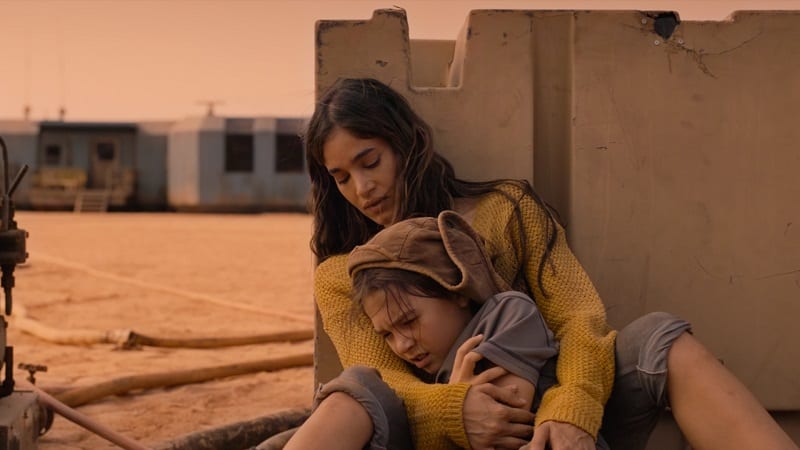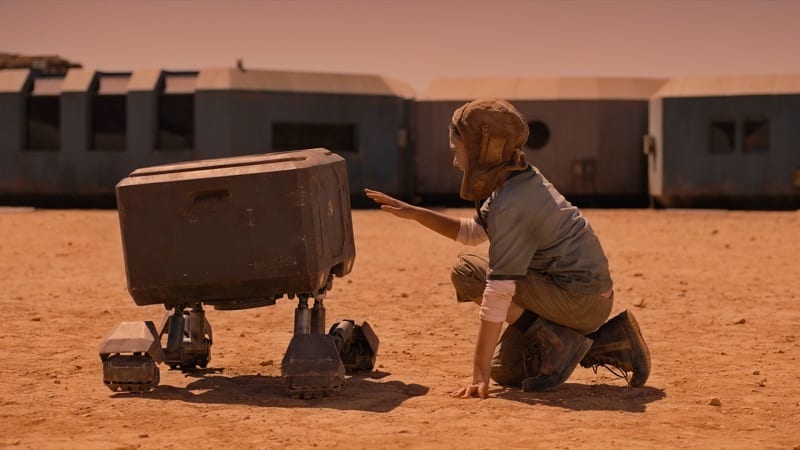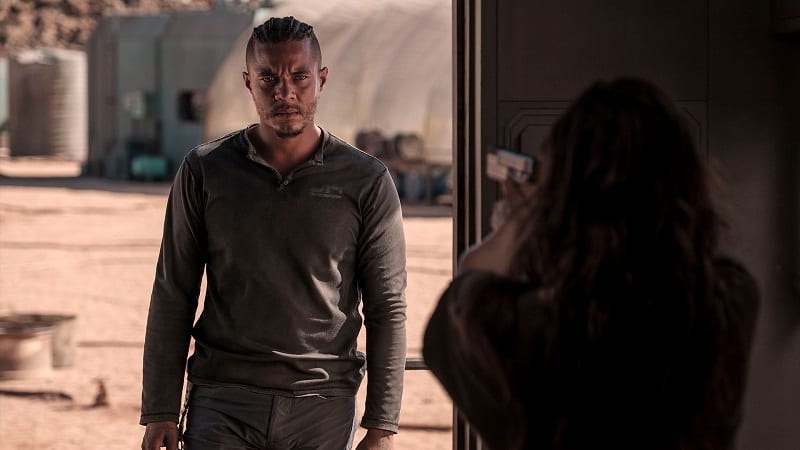In writer-director Matthew Rockefeller’s feature-film debut Settlers, a young girl living on a remote homestead finds herself and her family at the mercy of an ominous, threatening band of marauders with a charismatic, dangerous leader. If that description sounds just a little bit like John Ford’s The Searchers, Rockefeller’s film wears its Western influences proudly. Yet Settlers takes place not in the American Southwest but on Mars, where its young protagonist’s family lives in isolation. More a traditional Western than a science fiction film, Settlers—an IFC release on their independent Midnight imprint—transports the narrative tropes of the American Western to the science fiction landscapes of a planet that is hostile, barren, and foreboding. With handsome cinematography, innovative set design, and some stellar performances, Settlers leans into its story of a young girl’s loss of innocence and quest for independence.
Rockefeller makes excellent use of several simple narrative conceits. Young Remmy (Brooklyn Pierce) and her parents Reza (Jonny Lee Miller) and Ilsa (Sofia Boutella) live alone on a Martian valley outpost, their small tract and outbuildings threatened from outside. Rockefeller separates the script into three discrete chapters, each of them focused on one of the characters: first Reza, whose quick temper and quicker trigger finger defend his family but put him at risk; then Ilsa, who finds her loyalties divided between sustaining her existence and contemplating her future; and finally Jerry (Ismael Cruz Córdova), the interloper who seeks to reclaim his birthright. The narrative, though, is really all about Remmy, whose point of view delimits what viewers understand and whose development is charted through each of the three chapters. Her having witnessed the violence that impacts the others, Remmy’s is a unique character and perspective.
Shot on the Northern Cape in South Africa, Settlers’ simple exteriors make for a gorgeous, barren landscape, evocative at times of the iconography of John Ford’s Westerns. The Searchers in particular, with the familial homestead surrounded by dry, reddish sand and clay, susceptible to attack, seems like an obvious influence. The notion of the young girl held hostage and groomed for the future also echoes Ford, as does one of the film’s final shots, a lonely figure framed in the silhouette of a dark doorway against the Western expanse. The family’s domicile, a looping structure with large, panoramic windows illuminating the interiors, allows for some elegant natural lighting, and Willie Nel’s cinematography employs a largely static camera with impressively framed compositions to heighten the unease of claustrophobia.

The cast gives it their all. Among them, Sofia Boutella (The Mummy) is enigmatic as the mother Ilsa whose alliances must evolve in order for her to survive. Jonny Lee Miller as Reza and Ismael Cruz Córdova as Jerry bring a requisite testosterone to their roles; Cruz Córdova in particular makes for a complex antagonist whose motivations are perfectly plausible even if his methods become grotesque. Brooklyn Prince, so memorable in Sean Baker’s The Florida Project, marvels as young Remmy, her face perpetually scrunched in curiosity and determination. Settlers might not earn the audience of the Coens’ True Grit remake or Tarantino’s One Upon a Time in Hollywood, but Prince may remind some of young Hailee Steinfeld or Julia Butters in their breakout roles. With half the screen time Prince gets, Nell Tiger Free as an older Remmy gamely confronts Jerry’s methodical grooming.
But perhaps the most effective performance in the film belongs to the robot character Remmy names “Steve,” a simple assemblage of rotors and parts brought to life for the film’s second half. Part Wilson, part WALL*E, Steve makes the most of his simple gestures and postures to communicate effectively and empathetically with Remmy. Master Puppeteer William Todd Jones (Who Framed Roger Rabbit, Batman, Labyrinth) created a simple, functional, and engagingly communicative robot who grows a personality and a conscience. His growing resistance to Jerry’s commands echoes Kubrick’s HAL 9000 and his “I’m sorry, Dave” pronouncement. In a sci-fi Western with very little gunplay, an independent Steve gets the film’s most surprising—and emotional—moment.

But that moment, as pleasurable as it is, points to several conundrums with Settlers. The film aspires, like the best of science fiction, to thematic complexity, and Settlers raises some pretty big questions. What responsibilities do colonizers have to the colonized? Survivors, to perpetuate a species? Inventors, to the artificial intelligences they create? Settlers, to the sustainability of their environment?
Rockefeller’s script abandons any sustained effort to address any those broader philosophical questions or even some basic vagaries of the plot. At the film’s midpoint, a surprising revelation upends Remmy’s understanding of her world, but its existence goes largely unquestioned and unexplored. A later ten-year gap in the narrative serves little clear function other than to “age up” Remmy in time for her character to be threatened sexually by her captor. The third act seems connected to the two before only by virtue of its setting and characters and not much by the issues or questions they raised.
That said, the adult Remmy’s story of captivity and grooming makes far more explicit the kind of story traditional Westerns were unable to tell. As Sue Matheson’s recent work on Women in the Western (Edinburgh UP, 2020) makes clear, the genre has been historically dominated by male writers, directors, characters, and concerns. But the stories of women who worked to establish homesteads, defend against intruders, manage businesses, and raise families have received some even greater focus in recent decades and opened up the genre to new dimensions. Couple that historical perspective with the general lack of cinematic narratives featuring female protagonists, and Rockefeller’s focus on Remmy’s development from a naive child to an mature woman is more than welcome.

In the Western film genre, conflicts are traditionally resolved by gunfire. Might makes right, so to speak. And Settlers similarly concludes its conflicts with a bang—or two. But not with much attention to the broader thematic questions its first two acts develop. Its plot is resolved, its design arresting, its characters interesting, and the performances affecting: in the end, Settlers may never really find a singular place to call home, but its elliptical journey is a rewarding one nonetheless.



